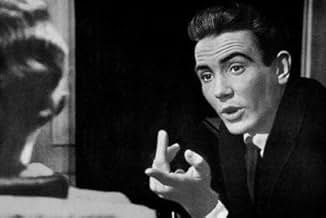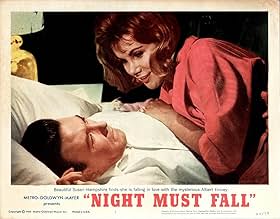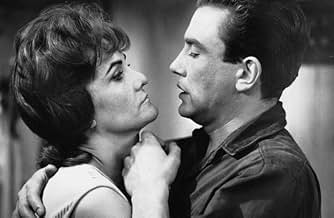Night Must Fall
- 1964
- 1h 41m
IMDb RATING
6.5/10
1.1K
YOUR RATING
A psychotic killer gets in the good graces of his aging invalid employer, and worms his way into the affection of her beautiful daughter, with unpleasant results for all.A psychotic killer gets in the good graces of his aging invalid employer, and worms his way into the affection of her beautiful daughter, with unpleasant results for all.A psychotic killer gets in the good graces of his aging invalid employer, and worms his way into the affection of her beautiful daughter, with unpleasant results for all.
- Awards
- 1 nomination total
Joe Beckett
- Detective
- (uncredited)
George Curtis
- Member of Search Party
- (uncredited)
Fred Davis
- Police Officer
- (uncredited)
Richard Neller
- Guest
- (uncredited)
Emile Stemmler
- Waiter
- (uncredited)
- Director
- Writers
- All cast & crew
- Production, box office & more at IMDbPro
Featured reviews
The remake of the 1937 film was slaughtered both by critics and audience at the time it premiered and there was mainly one reason for it:the crazed fans of Albert Finney were absolutely shocked,as he daringly chose the role of the psychotic ''killer with the angelic face'', following his all-time favorite roles of ''Saturday night and Sunday morning''and, particularly, ''Tom Jones''.As many historians mention, the ''MGM wives'' who were few of the first to see the film, turned violently against the gifted director, Karel Reisz, shouting ''what have you done to that beautiful boy?''!But this is not a serious reason to dismiss an, overall, very good film, which, however, has some serious flaws.The use of music is exaggerated and some times irritating and, only in the first part of the film, Finney doesn't quite know how to tackle with his disturbed character. But the photography is great, Mona Washbourne gives a superb performance and Karel Reisz does a great job, not only updating the old text and bringing it within the ''realism'' of the British Free Cinema movement, but also with his masterful camera movements and his use of editing and abruptly cutting to different scenes, he creates an imposing psychological thriller, where what you don't see is more disturbing than what you do. Being one of the greatest actors EVER, Finney soon finds a convincing attitude for his character and the last part of the film is absolutely brilliant as a whole.It should be re-examined and re-appreciated, that's why it has to come out on VHS and DVD a.s.a.p.! 7.5/10
This project was done in a hurry when a proposal to make a film of Ned Kelly was axed by MGM due to budget worries (at this time Tom Jones had been filmed but not released).
It is not clear why Riesz decided to make a film of this play. Clearly, the part of Danny is tailor made for some show-off acting and Finney grabs the bull by the horns here. His only real mistake is to put on a silly 'boyo Welsh accent. True, the character was Welsh in the play but that's because the part was written by the playwright to play himself. Otherwise, there is no dramatic need for Danny to have a Welsh accent and Robert Montgomery didn't bother in the 1937 version.
The main difference between the film and the play is that the film reveals its hand in the first minute that Danny is a psycho killer. In the play, its not clear until near the end and much of the dialogue are cat n'mouse exchanges between Danny and Olivia.
The result of this is to create a somewhat boring film; you know who the killer is and thus spend an hour and a hour waiting for him to explode. When he does, it has little logic and, to an audience used to the likes of Psycho and its rip-offs like Homicidal, seeing Finney deliver one blow to an off-screen body that you never get to see was always going to be a serious let-down. His retreat into gibberish at the end I thought was uncharacteristic and a cop-out. You never find out who the real Danny is and why he has acted like he has done. I did enjoy the 'hangbags' between Sheila Hancock and Susan Hampshire on the high street of an authentically 60s wet Hertfordshire town.
It is not clear why Riesz decided to make a film of this play. Clearly, the part of Danny is tailor made for some show-off acting and Finney grabs the bull by the horns here. His only real mistake is to put on a silly 'boyo Welsh accent. True, the character was Welsh in the play but that's because the part was written by the playwright to play himself. Otherwise, there is no dramatic need for Danny to have a Welsh accent and Robert Montgomery didn't bother in the 1937 version.
The main difference between the film and the play is that the film reveals its hand in the first minute that Danny is a psycho killer. In the play, its not clear until near the end and much of the dialogue are cat n'mouse exchanges between Danny and Olivia.
The result of this is to create a somewhat boring film; you know who the killer is and thus spend an hour and a hour waiting for him to explode. When he does, it has little logic and, to an audience used to the likes of Psycho and its rip-offs like Homicidal, seeing Finney deliver one blow to an off-screen body that you never get to see was always going to be a serious let-down. His retreat into gibberish at the end I thought was uncharacteristic and a cop-out. You never find out who the real Danny is and why he has acted like he has done. I did enjoy the 'hangbags' between Sheila Hancock and Susan Hampshire on the high street of an authentically 60s wet Hertfordshire town.
You can tell that Danny (Albery Finney) ain't quite right by the erratic way he rides his scooter. And the fact that we see him chopping up and disposing of a body in the opening scene.
Having charmed his way into the knickers of maid Dora Parkoe (Sheila Hancock), knocking her up, Danny worms his way into the household of Dora's employer, elderly Mrs. Bramson (Mona Washbourne). At first, the old lady's daughter Olivia (Susan Hampshire) dislikes Danny, but the young man's rizz eventually wins her over. But what does Danny keep in the hat box in his room?
Predating real-life serial killer Ted Bundy's activities by a decade, Night Must Fall is a fascinating study of a psychopath who, on the surface, is a charismatic individual, but who is, in reality, a deeply disturbed whack job. While Danny works his magic on Mrs. Bramsom and Olivia, the police are dragging the nearby lake for a missing woman, eventually finding her body, minus the head. And although we never see the missing noggin, it's made pretty obvious where it is (with scenes reminiscent of the infamous box incident recounted by Jeffery Dahmer's father).
Despite adopting a rather annoying 'boyo' Welsh accent for the role, Finney is excellent as the manipulative psychopath, lending his character a much-needed sense of realness (as one might expect from an actor who found fame in the kitchen-sink drama genre). We get glimpses into Danny's past, giving us an insight into what has made him so flaky, both his mother and father dying when he was very young; this also goes some way to explaining the rather perverse mother/son relationship he develops with Mrs. Bransom, which leads to the film's shocking climax.
Well acted, grim, and surprisingly brutal at times, Night Must Fall is a compelling study of a dangerous individual, and, although I didn't quite buy into the ending, in which Danny realises that the game is up and is reduced to a gibbering wreck, I still recommend the film to fans of gritty psycho-thrillers.
Having charmed his way into the knickers of maid Dora Parkoe (Sheila Hancock), knocking her up, Danny worms his way into the household of Dora's employer, elderly Mrs. Bramson (Mona Washbourne). At first, the old lady's daughter Olivia (Susan Hampshire) dislikes Danny, but the young man's rizz eventually wins her over. But what does Danny keep in the hat box in his room?
Predating real-life serial killer Ted Bundy's activities by a decade, Night Must Fall is a fascinating study of a psychopath who, on the surface, is a charismatic individual, but who is, in reality, a deeply disturbed whack job. While Danny works his magic on Mrs. Bramsom and Olivia, the police are dragging the nearby lake for a missing woman, eventually finding her body, minus the head. And although we never see the missing noggin, it's made pretty obvious where it is (with scenes reminiscent of the infamous box incident recounted by Jeffery Dahmer's father).
Despite adopting a rather annoying 'boyo' Welsh accent for the role, Finney is excellent as the manipulative psychopath, lending his character a much-needed sense of realness (as one might expect from an actor who found fame in the kitchen-sink drama genre). We get glimpses into Danny's past, giving us an insight into what has made him so flaky, both his mother and father dying when he was very young; this also goes some way to explaining the rather perverse mother/son relationship he develops with Mrs. Bransom, which leads to the film's shocking climax.
Well acted, grim, and surprisingly brutal at times, Night Must Fall is a compelling study of a dangerous individual, and, although I didn't quite buy into the ending, in which Danny realises that the game is up and is reduced to a gibbering wreck, I still recommend the film to fans of gritty psycho-thrillers.
A critical failure at the time of its release and considered something of a let-down for its director and star, (it was certainly an odd choice of material), this 1964 film version of Emlyn Williams' play, (it was written in 1935 and filmed two years later with Robert Montgomery), is nowhere near as bad as people say. It's the one about the young psychopath, (a terrific Albert Finney), who worms his way into the affections of elderly invalid Mona Washbourne, (superb), and her initially stand-offish daughter, (an excellent Susan Hampshire). The problem is that in attempting to get to the psychological heart of the piece director Karl Reisz drains it of all suspense and Clive Exton's screenplay, (I haven't seen or read the original play), is a bit on the dull side. But neither is it a disaster and I have never understood why it disappeared so soon after its initial appearance.
I've heard about this British gem, and I was stoked to see that it was on TCM (UK) the other night. Albert Finney is superb as Danny, well the entire cast is very strong. I'd heard about it from the Freddie Francis link (he was Director of Photography)and I wasn't disappointed, it just has his unique stamp all over it.
For most of the film, the audience is waiting for something to happen as the tension is kept to a maximum throughout the film. The final payoff is superb and shows just why Finney is one of Britains best actors. I thought it was a lot like that other British twisted family oddity 'Girly' (US title) but with fewer sexual undertones.
It's a shame Night Must Fall isn't more well known as it's a true gem of 60's British cinema.
For most of the film, the audience is waiting for something to happen as the tension is kept to a maximum throughout the film. The final payoff is superb and shows just why Finney is one of Britains best actors. I thought it was a lot like that other British twisted family oddity 'Girly' (US title) but with fewer sexual undertones.
It's a shame Night Must Fall isn't more well known as it's a true gem of 60's British cinema.
Did you know
- TriviaKarel Reisz and Albert Finney had spent a year, including 10 weeks scouting Australian locations, developing a "Ned Kelly" project, but after Columbia finally pulled the plug, they quickly set up "Night Must Fall" at MGM.
- GoofsWhen Olivia is driving home from town, and it's pouring down, there is very heavy 'rain' falling in front of the car as she goes down the hill. In the near background, all of the treetops are still.
- ConnectionsFeatured in MGM Is on the Move! (1964)
- How long is Night Must Fall?Powered by Alexa
Details
- Release date
- Country of origin
- Languages
- Also known as
- Al caer la noche
- Filming locations
- Production companies
- See more company credits at IMDbPro
- Runtime
- 1h 41m(101 min)
- Color
- Aspect ratio
- 1.66 : 1
Contribute to this page
Suggest an edit or add missing content


























